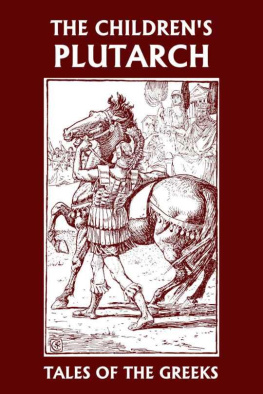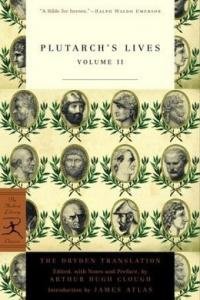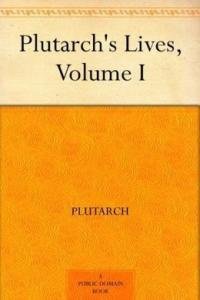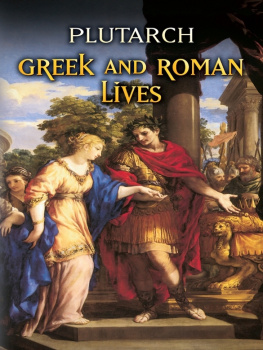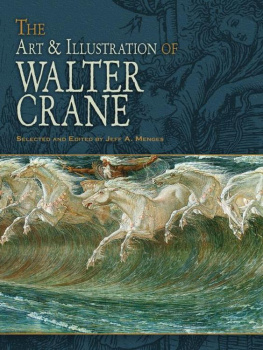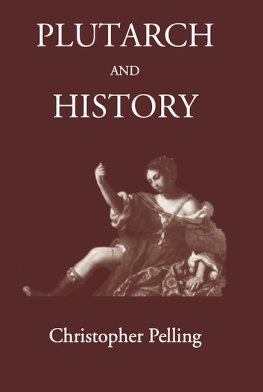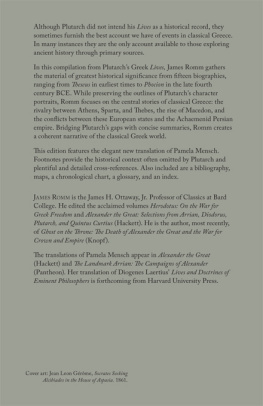Tales of the Greeks
The Children's Plutarch
by
F. J. Gould
Yesterday's Classics
Chapel Hill, North Carolina
Cover and Arrangement 2010 Yesterday's Classics, LLC
All rights reserved. No part of this book may be reproduced or retransmitted in any form or by any means without the written permission of the publisher.
This edition, first published in 2010 by Yesterday's Classics, an imprint of Yesterday's Classics, LLC, is an unabridged republication of the work originally published by Harper & Brothers in 1910. This title is available in a print edition (ISBN 978-1-59915-162-5).
Yesterday's Classics, LLC
PO Box 3418
Chapel Hill, NC 27515
Yesterday's Classics
Yesterday's Classics republishes classic books for children from the golden age of children's literature, the era from 1880 to 1920. Many of our titles are offered in high-quality paperback editions, with text cast in modern easy-to-read type for today's readers. The illustrations from the original volumes are included except in those few cases where the quality of the original images is too low to make their reproduction feasible. Unless specified otherwise, color illustrations in the original volumes are rendered in black and white in our print editions.
Introduction
It is more a pleasure than I can well say to write of this little book which Mr. Gould has made for the children out of Plutarch's great book. The work is very well done, indeed, with a feeling for the original and a faith in it which no criticism or research can ever quite dissipate; for in spite of all the knowledge of Greece and Rome which the study of scholars has since brought us, the Greece and Rome of Plutarch, which, for the English race, became the Greece and Rome of Shakespeare and of Goldsmith, will remain to the end of time the universal countries, with the "cities of the soul" for their capitals. As I read these wonder-stories which Mr. Gould has so simply, so clearly, so wisely retold, I shared again that stir and thrill of the heart which the Italian poet Alfieri records, with his fine frenzy: "The book of books for me, and the one which caused me to pass hours of bliss and rapture, was Plutarch, his lives of the truly great; and some of these, as Timoleon, Caesar, Brutus, Pelopidas, Cato, and others, I read and read again with such a transport of cries, tears, and fury that if any one had heard me in the next room he would surely have thought me mad."
I should not wish the readers of these moving tales to be quite so violently affected as all this, even when, in later life, they go from them to the same stories as Plutarch himself tells them, which I hope they will be impatient to do. There they will learn much more about the general life of Greece and Rome than they can learn from this book and its mate, Plutarch's Romans, and will see the difference between the two peoples, as Plutarch brings it out by giving first the life of a famous Grecian, and next the life of a famous Roman, and then comparing the two. I think Mr. Gould has done well to put all the Grecians together and all the Romans together, for otherwise it would be confusing to children who did not know their history, and did not realize how long after the Grecians the Romans came. I also like the gentle and right feeling in which he treats the facts, and will not allow any dazzle of glory to blind his readers as to the right and the wrong of the things that happen in the men that do or suffer the things. From time to time he speaks of that awful and cruel crime against human nature, that slavery on which the grandeur and the splendor of the whole ancient world was founded. But he does not, that I remember, make it plain how men and women and children; taken prisoners in war, or even peaceful strangers visiting a Greek city without the protection of some friendly citizen, could be robbed of their freedom and fortune and sold into lifelong slavery, with no more rights than the beasts of the field. I would have had him dwell on this fact, not so as to spoil the children's pleasure in the beautiful and noble things that the Greeks unselfishly did for their country and for one another, but so as to make them understand how in our strangely mixed humanity men could die heroes and martyrs to their country's cause while they lived masters of those whom they denied liberty and country and the ownership of their lives and limbs.
I would have the children who read this glowing book, so full of examples of sublime self-sacrifice, see that the Spartans were heroic champions of freedom in spite of holding the Helots in bitter bondage, and that the Athenians who fell in battle for their mother city could be her devoted children though they forbade their hapless stepbrothers her love and blessing. In such things the Greeks were savage, as the Hebrews were who also bought and sold their fellow-men.
The thing which seems to have made the Spartans so mighty in war and the Athenians so glorious in peace is another thing that Mr. Gould does not dwell on. It was their being, with all the other Greeks, republicans. This made them patriots as no other form of government could; it made each of them feel that he had the same stake in his country that he had in his own homethat his country was his home. Under monarchical governments, where the freeman is still the subject of the prince and not the citizen of the state, the patriot's creed is King and Country, with the King first; but in a republic it is Country first, last, and always, and never Country and President or Governor, no matter how good and great such men may be. Even with our Mother England, where people are as free to think, to speak, to write as we are, and may say what they please of the sovereign, still the cry is King and Country, and men live in the superstition that a king is somehow sacred and somehow superhuman. Their words deny this, while their lives declare it; but in Greece, as long as the Greeks were free, they had no such superstition. They were great because they were democratic republicans and were once as the Americans and the French and the Swiss are now; and I would not have the children forget this. After the Macedonians conquered the true Grecians, and the Romans fell a prey to the tyrants whom their own luxury and ambition and riches had created, all was indeed changed, but it is not such Grecians or such Romans that Plutarch glorifies.
W. D. H OWELLS.
Preface
It appeared to me that, by way of preliminary to lessons on justice, government, political progress, etc., it would be well to create in the child-nature a sympathy for some definite historic movement. With this sympathy as a basis, one could better build up conceptions of social justice, civic evolution, and international relations. I could think of no finer material for this purpose than the admirable biographies of Plutarch; though the national history, or the history of Western Europe generally, would doubtless serve the same end. Western history, however, derives its traditions from Greece and Rome, and it seemed to me an advantage to use a work which not only furnished simple instruction in the meaning of politics, but also held rank as a literary classic. My version is intended for children aged about ten to fourteen, after which period they should be encouraged to go direct to the wise, manly, and entertaining pages of Plutarch himself. The ethical index is framed for the use of teachers who wish for examples to illustrate the moral lessons which are now becoming a recognized part of the regular school education. The spirit of my selection from Plutarch's ample store is aptly represented in the beautiful drawings by Mr. Walter Crane.

